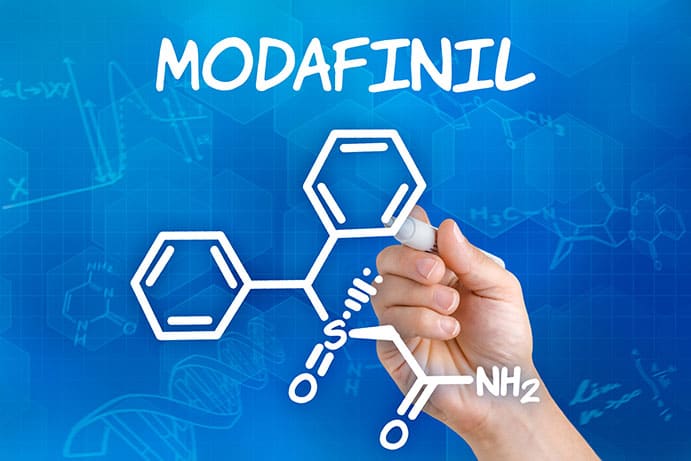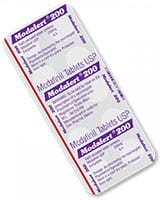

In an era of expedited travel, we can rapidly cross oceans and time zones. Sometimes, however,
Up to two-thirds of travellers suffer from jet lag. Naturally, the more time zones one traverses, the worse the jet lag can be.
Modafinil has emerged as a promising nootropic to stave off the negative effects of jet lag. In this article, we will explore what long-distance travelling does to our brains and bodies, and how modafinil may be an effective intervention for jet lag, all backed by recent research.
The Dark Side of Traveling: Jet Lag Syndrome (JLS)
Our circadian rhythm is the internal biological clock that governs many important bodily functions, including sleeping patterns, feeding patterns, and cellular regeneration. Long-distance travel commonly disrupts the circadian rhythm, resulting in sleep-related disturbances such as acute sleep deprivation or sleep fragmentation. These disruptions are largely responsible for the cognitive and physiological impairments of long-distance East-West or West-East travel, including:
- Diminished attention and concentration
- Daytime sleepiness
- Deficits in psychomotor performance
- Reduced memory processing
- Impairments in executive function
- Gastrointestinal discomfort
- Headaches
These symptoms in whole or in part constitute jet lag syndrome (JLS), a temporary clinical disorder that commonly affects transmeridian travelers. [1]Weingarten, J. A., & Collop, N. A. (2013). Air Travel. Chest, 144(4), 1394–1401.
Many pharmacological and behavioural strategies have been devised to combat the effects of jetlag, with limited success. Drugs such as amphetamines promote wakefulness but can bring adverse cardiovascular side effects and the potential for abuse. Sleeping pills can promote sleep and circadian rhythm shifts, but possible side effects like daytime fatigue can make them often unfeasible, especially when travelling for work.
Modafinil: A Promising Eugeroic for Travel-related Disturbances
What is Modafinil?

Modafinil has recently gained attention as a promising drug for jet lag while offering little to none of the jitteriness and sleep-related disturbances from caffeine and other stimulants.
Modafinil is manufactured by Cephalon and classified as a eugeroic, or “wakefulness-promoting agent”. It is thought to increase dopamine, histamine, and norepinephrine signalling in various regions of the brain. These neurotransmitters are crucially important for wakefulness and psychomotor performance. [2]McCarty D. E. (2010). Ready for takeoff? A critical review of armodafinil and modafinil for the treatment of sleepiness associated with jet lag. Nature and science of sleep, 2, 85–94. More recently, Cephalon produced Armodafinil, a version of Modafinil with almost identical pharmacological action but with a longer half-life.
They are approved by the FDA for treating daytime sleepiness associated with narcolepsy, obstructive sleep apnea, and shift work sleep disorder, but they are increasingly being used off-label for its cognitive-enhancing effects.
Armodafinil and Modafinil Improves Cognitive Performance and Sleepiness Caused by Circadian Rhythm Disorders

Shift work sleep disorder (SWSD), especially among people in travel-related jobs, and jet lag syndrome have very similar symptoms since they are both caused by sleep and circadian rhythm disturbances. Modafinil is effective in easing some symptoms of SWSD, which makes it an attractive option for jet lag.
In a 2005 study of 209 workers with SWSD, 200mg of modafinil was shown to improve wakefulness, subjective sleepiness, and psychomotor vigilance while reducing accidents and near-accidents on their commute home, when compared to a placebo. [3]Czeisler, C. A., Walsh, J. K., Roth, T., Hughes, R. J., Wright, K. P., Kingsbury, L., … Dinges, D. F. (2005). Modafinil for Excessive Sleepiness Associated with Shift-Work Sleep Disorder. New England Journal of Medicine, 353(5), 476–486.
In a similar 2009 study of 254 night shift and rotating workers with SWSD, 150 mg of armodafinil was given thirty minutes to an hour before a night shift. Armodafinil reduced commute and worktime sleepiness. It also significantly improved performance on standardized measures of attention and memory. [4]Czeisler CA, Walsh JK, Wesnes KA, et al. (2009). Armodafinil for treatment of excessive sleepiness associated with shift work disorder: a randomized controlled study. Mayo Clin Proc, 84(11):958–972.
In light of studies like these, researchers in 2009 set out to investigate the effects of armodafinil on 427 individuals with jet lag syndrome in a three-day study. In the phase 3 clinical trial, individuals travelled six time zones eastbound and were given either 50mg/150mg of armodafinil or a placebo on arrival. The researchers found dose-dependent improvements in objective and subjective measures of sleepiness. Additionally, less severe symptoms of jet lag were found in the 150mg armodafinil group relative to the placebo group as measured by the mean patient global impression of clinical severity of illness (PGI-S), but scores reached placebo levels by days two and three. [5]Rosenberg, R. P., Bogan, R. K., Tiller, J. M., Yang, R., Youakim, J. M., Earl, C. Q., & Roth, T. (2010). A Phase 3, Double-Blind, Randomized, Placebo-Controlled Study of Armodafinil for Excessive Sleepiness Associated With Jet Lag Disorder. Mayo Clinic Proceedings, 85(7), 630–638.
Verdict
Modafinil and Armodafinil are not currently approved for jet lag syndrome. However, studies involving SWSD patients, along with small clinical trials in patients with jet lag syndrome, are showing both drugs to have great efficacy and therapeutic potential for improving sleepiness and other cognitive symptoms associated with jet lag.
Based on the studies, a single, cost-effective dose of 150-200mg may be effective for reducing jet lag, especially when strategically combined with other well-supported jet lag treatments such as light exposure therapy and melatonin.
Safety
Modafinil and Armodafinil are generally well-tolerated, but a small minority of those who take it may experience side effects such as headache, diarrhea, nausea, back pain, and heart palpitations. [6]Zee, P. C., & Goldstein, C. A. (2010). Treatment of Shift Work Disorder and Jet Lag. Current Treatment Options in Neurology, 12(5), 396–411. Neither should be taken if you have heart problems, liver issues, or a history of psychosis. Consider consulting with a medical professional before use.
Buy Modafinil Online Review Comparison Table
| Product | Company | Quantity | Price | Country | Website |
 Modalert, Modvigil | ModafinilXL | 10 - 500 pills (100 & 200mg) | $29 - $599 |  AU, USA, Worldwide | Visit Website >> |
References
| ↑1 | Weingarten, J. A., & Collop, N. A. (2013). Air Travel. Chest, 144(4), 1394–1401. |
|---|---|
| ↑2 | McCarty D. E. (2010). Ready for takeoff? A critical review of armodafinil and modafinil for the treatment of sleepiness associated with jet lag. Nature and science of sleep, 2, 85–94. |
| ↑3 | Czeisler, C. A., Walsh, J. K., Roth, T., Hughes, R. J., Wright, K. P., Kingsbury, L., … Dinges, D. F. (2005). Modafinil for Excessive Sleepiness Associated with Shift-Work Sleep Disorder. New England Journal of Medicine, 353(5), 476–486. |
| ↑4 | Czeisler CA, Walsh JK, Wesnes KA, et al. (2009). Armodafinil for treatment of excessive sleepiness associated with shift work disorder: a randomized controlled study. Mayo Clin Proc, 84(11):958–972. |
| ↑5 | Rosenberg, R. P., Bogan, R. K., Tiller, J. M., Yang, R., Youakim, J. M., Earl, C. Q., & Roth, T. (2010). A Phase 3, Double-Blind, Randomized, Placebo-Controlled Study of Armodafinil for Excessive Sleepiness Associated With Jet Lag Disorder. Mayo Clinic Proceedings, 85(7), 630–638. |
| ↑6 | Zee, P. C., & Goldstein, C. A. (2010). Treatment of Shift Work Disorder and Jet Lag. Current Treatment Options in Neurology, 12(5), 396–411. |

Leave a Reply